Del reviews ‘Call Me By Your Name’

Image courtesy of Sony Pictures.
“Call Me By Your Name” Starring Timothee Chalamet, Armie Hammer, Michael Stuhlbarg, Amira Casar. Directed by Luca Guadagnino. 2 hours, 12 minutes. Rated R.
Del’s take
You’re lying on the beach. It is the first warm day of spring.
You feel the pressure of sunlight on your skin. The warmth is soaking into you, all the way to the bone, melting your body so that it flows into the sand. You’re smiling, and at first you don’t know why. But then you remember. Your hand slides across the beach towel until it encounters oily flesh. Is this a dream? Is it a fantasy? You squint against the brightness.
No. This is not a dream. Your smile broadens and you surrender yourself to the love of everything.
Watching “Call Me By Your Name,” Luca Guadignino’s romantic summer dream, is like lying on that mythical beach. It is warm and surreal and funny at times, unwinding at a languorous pace that matches its setting, a bucolic Italian countryside villa basking in the simplicity of 1983, before technology ruined our lives.
The movie is a near-faithful rendering of André Aciman’s acclaimed novel of the same name. Having read the book, I would say the movie is an improvement as it streamlines the story and does away with the viewpoint character’s neurotic internal monologues. Here we are left with soul stripped bare: a 17-year-old boy and his desire, both romantic and physical, for a 20-something grad student.
It has drawn some criticism in the States for depicting a sexual relationship with a minor. I won’t argue for or against such a thing, but it should be pointed out the age of consent in Italy, where CMBYN takes place, is 16.

The story is about young Elio (Chalamet), who is staying with his college professor father (Stuhlberg) and mother (Casar) at their summer residence in Italy. Each year the good professor takes on a research assistant to help with him with his work. This summer’s arrival is the hunky Oliver (Hammer).
Elio is intrigued by the insouciant American, who dismisses him with a casual “Later” and seems to prefer the company of local young ladies or the poker-playing barflies of a nearby tavern. But all may not be as it seems. Is Oliver secretly interested in Elio? Should Elio give thought to his desires? The two begin a sometimes subtle, sometimes brutally obvious process of opening and closing the distance between themselves, like two heavenly bodies trapped in each other’s gravitational pull, until the inevitable collision takes place.
It is a sweetly choreographed dance between the two, set to the universal soundtrack of love and heartbreak that anybody, regardless of sexual orientation, can appreciate. We have all been there before. With luck, some of us will go there again. It makes life worth living.
Performances are spectacular. Stuhlbarg shines as Elio’s father, and saves his best moment for the waning minutes of the movie, where he delivers a searing monologue to his son that simultaneously crushes and inspires. To have a father like that.
Chalamet is dazzling as Elio. The media, in rhapsodizing about his performance, have declared that he is now a movie star. I rarely give credit to such excesses but in this case there is no excess. His performance is astounding.
Less impressive is Hammer as Oliver. Apart from his breakout performance in “The Social Network,” Hammer can’t seem to stop himself from bringing a certain doofiness to his roles. In CMBYN he tries not to do that, but throughout the movie, except during rare moments, he never seems comfortable in his skin and always on the verge of a joke or a mug for the camera.
The movie is smartly written and features a lush, verdant Italian countryside that functions as a controlling element of the story, much as the snow in the Swedish version of “Let the Right One In.” And despite the presence of so many Americans in the cast and creatives, the movie, thanks to Guadignino, presents itself as distinctly European in structure and tone.
CMBYN has been nominated for four Academy Awards, and I think it could win three – for best movie, best adapted work, and best song. Chalamet has been nominated for best actor but is up against the magnificent Gary Oldman, who is said to be mesmerizing in “Darkest Hour.”
That’s a shame, because Chalamet deserves recognition for his performance, as does Guadagnino for his direction. The movie is an emotional kick in the gut, one that elicits wild praise from its audiences, not to mention oceans of tears.
Much has been made about the final scene. I thought I was prepared for it, but I wasn’t. The vision of a defeated Elio, younger than his 17 years, slumped before an evening fire, a faint crackle in the background, his eyes glistening and his lips quivering while his mother and housekeeper, oblivious to his pain, set the dinner table in the background … and a mournful Sufjan Stevens quietly sings to us that “I have loved you for the last time … I have kissed you for the last time” … well, it is shattering.
I sat there, stunned.
And.
For the first time in all the years I have been watching movies, not one person in that theater – not one – left his seat until the credits had finished, the screen went dark, and there was nothing left to do but get up, go home and cry.
Grade: A.
Del Stone Jr. is a former journalist and author.
![]()
Leave a Reply